Mastiphal
Wywiad przeprowadził Wouter Roemers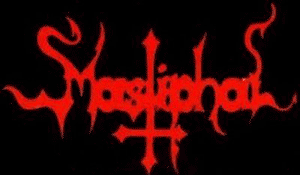 The black metal of the early 1990's is mostly associated with North-European countries such as Norway, Sweden and Finland. Around the same time in East-Europe the scene was exploding as well. In Poland, specifically, three bands formed that would form cornerstone functions in this pioneering genre: Christ Agony, Xantotol and Mastiphal. Witching Hour Productions released a lush double-digipack of Mastiphal's recorded history with "Damnatio Memoriae". Masterful Magazine recently was able to arrange a chat with Mastiphal mainman Rafal "Flauros" Góral. This resulted in a spirited conversation about the early black metal scene and mentality, the struggles and tribulations of bands behind the Iron Curtain and why it took so long to get Mastiphal's recorded history re-issued and available again.
The black metal of the early 1990's is mostly associated with North-European countries such as Norway, Sweden and Finland. Around the same time in East-Europe the scene was exploding as well. In Poland, specifically, three bands formed that would form cornerstone functions in this pioneering genre: Christ Agony, Xantotol and Mastiphal. Witching Hour Productions released a lush double-digipack of Mastiphal's recorded history with "Damnatio Memoriae". Masterful Magazine recently was able to arrange a chat with Mastiphal mainman Rafal "Flauros" Góral. This resulted in a spirited conversation about the early black metal scene and mentality, the struggles and tribulations of bands behind the Iron Curtain and why it took so long to get Mastiphal's recorded history re-issued and available again.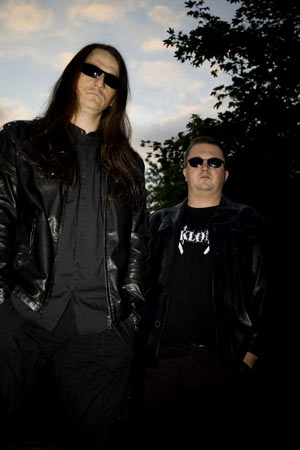 Hi Rafal! Thanks for doing this interview with us. How does it feel to have Mastiphal's recorded output finally compiled and available again?
Hi Rafal! Thanks for doing this interview with us. How does it feel to have Mastiphal's recorded output finally compiled and available again?
Firstly, it's great fun for people who still remember our band, and especially for ourselves. As all labels which had released the Mastiphal's albums in 90's do not exist anymore, our music disappeared from music stores or different distros some time ago. However, our records were sold for pretty good cash on Internet auction sites, so we knew that there was a demand for Mastiphal albums, and people still wanted to buy them. Within the space of the last years, we were offered to rerelease Mastiphal albums several times, but it didn't seem very serious or no one gave us a solid guarantee that it would be done properly. Then, we came across Witching Hour who convinced us to do that and I think that they made a perfect job. Believe me, I really enjoy listening our old records released in a very professional way.
Mastiphal was formed in Katowice, Poland in 1992 under the name Dissolution. Did it start out as just a couple of friends jamming out to their favourite bands – or did you have an immediate idea of what you wanted Dissolution and eventually Mastiphal to sound like?
Dissolution was founded in '91. One year after we changed the name into Mastiphal. It was great times, many awesome death metal albums were recorded and at the same time the black metal scene was arising. From the start, we had a precise idea of what we want to be and do. Our music was deeply rooted in death metal, however we were also under the influence of bands such as Possessed or Celtic Frost. You have to remember that we were 14-16 years old and we quickly swallowed all we were fascinated by. Therefore, our music was marked by many sounds that were very inspiring for us. Undoubtedly, what we did as Mastiphal resulted from a more aware choice. There's no denying that the emergence of Scandinavian black metal, especially in Norway, made an important impact on changes in our music. After a while, we got more and more conscious of what we want our band to sound and look like.
As Dissolution you gained a considerable local following and did a number of one-off gigs with established acts such as Liers In Wait (pre-At the Gates), Pandemonium and Vader.
Indeed, we did several gigs at the turn of '91 and '92. We took an opportunity to play with truly remarkable underground bands. Each of them made a great impression on us and we had a chance to learn a lot from them. I particularly remember the gig with Liers in Wait. Playing with them was a capital experience. Those guys were absolutely awesome! I also appreciate to have played with Vader who were taking first steps on the international metal scene.
Mastiphal derived its name from the name given to the prince of demons in an apocryphal book entitled "Little Genesis", which was quoted by Byzantine historian Georgios Kedrenos. Tell us something about the origin and meaning of Mastiphal, I had a hard time tracking down any notable information on it.
Mastiphal is one of the princes of darkness whose name is not as common among writers or artist as Lucifer, Beelzebub or Azazel. Rarely quoted and mentioned in the arts, he shares, however, many features with them. Moreover, he's more mysterious (laughs). We always avoided giving the literal sense of things, trying to make them more difficult to puzzle out.
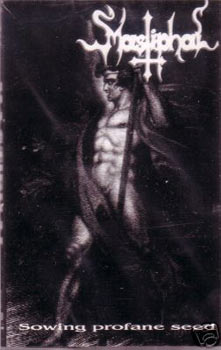 1993 saw the formation of another Mastiphal in Gdansk, a band which at one point would feature session drums by Adam "Nergal" Darski, who would go on to front now established death/black metal mammoth Behemoth. Did this give any problems that you remember, with two black metal acts operating under the same name?
1993 saw the formation of another Mastiphal in Gdansk, a band which at one point would feature session drums by Adam "Nergal" Darski, who would go on to front now established death/black metal mammoth Behemoth. Did this give any problems that you remember, with two black metal acts operating under the same name?
Oh yeah, there were problems. We slung mud at one another threatening to do I don't know what (laughs)! You know, I'm talking about that tongue-in-cheek. We were all very young and we should take it easy. On the other hand, the music has settled this argument. The another Mastiphal has vanished into the blue…
In 1994 you recorded your first demo "Sowing Profane Seed" under the Mastiphal moniker, which was later picked up by Baron Records. How was it composing, rehearsing and eventually recording this first demo?
As far as I remember, things went very quickly and smoothly. We were tremendously fascinated by what we were doing and wanted to show the fruits of our labour to the whole world as quickly as possible. It was something fresh and original. None of black metal bands had used keyboards in a such way before. I remember that Nocturnus, even though they played death metal, were very inspiring for us on the matter of using keyboards. They were the first metal band to use keyboards in an original way
"Sowing Profane Seed" was recorded at Fors Studio in Cieszyn, near to the Czech Republic border. That must have been quite an adventure. Recording a demo almost out of your home country, how do you remember the recording sessions for this particular release?
We made an unusual decision to record at Fors because we had heard several productions from them before. They had all a dark, warm and analogue atmosphere at the same time. You know, there were no computers at that time and everything was recorded on tape. I wish I had that tapes on my CDs shelf to be able to remix that stuff someday. Unfortunately, it's impossible. I remember that we used a four-track recorder mixing the stuff right away and we couldn't change any decision once it had been made. However, it was incredibly charming. I'd say quite uncanny. Another reason of our decision was that products and services were much cheaper in the Czech Republic at that time. The Poles used to go shopping there or spend their holidays under canvas, drinking gallons of delicious Czech beer. In short, our stay in Cieszyn was a wonderful adventure. Oceans of beer, lots of dark music and a great atmosphere in a small Czech town.
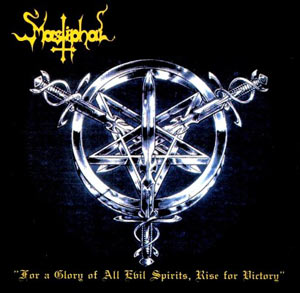 "For A Glory Of All Evil Spirits, Rise for Victory" – Mastiphal's proper debut record – was recorded at Music Project Studio in Katowice, Poland. The production on this is notably better in quality compared to "Sowing Profane Seed". In what ways were these sessions different than the ones from the demo? Came the band better prepared and well-rehearsed into the studio to cut this album?
"For A Glory Of All Evil Spirits, Rise for Victory" – Mastiphal's proper debut record – was recorded at Music Project Studio in Katowice, Poland. The production on this is notably better in quality compared to "Sowing Profane Seed". In what ways were these sessions different than the ones from the demo? Came the band better prepared and well-rehearsed into the studio to cut this album?
To be fair, we had a very tight budget entering in the studio as we hadn't signed a contract with any label before. Although Fors had an unforgotten atmosphere, it was far from being a modern studio even at that time. However, when we recorded our debut album, we had a much more decent budget. It was ten times bigger than for recording our demo. Therefore, we chose Music Projekt Studio which was one of the best studios in the city. An interesting thing here is that another band recorded in the studio at the same time. They were called Kaliber 44. They used to record in the morning whereas we used to record on the afternoon shift. I remember that our relationships were quite tense as we changed their settings of the mixing console and they changed ours. After all, it seems that it did them good, because their album quickly turned out to be very successful on the Polish hip-hop scene (laughs).
A year later, in 1995, your debut "For A Glory Of All Evil Spirits, Rise for Victory" was released through Baron Records. Was the recording contract with Baron Records just for the demo and the full length?
We used to extend our contract with Baron Records after each release. However, having released "For a Glory…", we decided to change and release the next album somewhere else.
Baron Records was a pretty prestigious label back in the day. In 1994 they had released Vader's "Sothis" EP and re-issued their legendary "Morbid Reich" demo tape on CD. That must have been a pretty big deal, signing with a label that had already made a name for itself in the extreme metal scene?
That's absolutely true! At that time, signing a contract with Baron Records was a pretty big deal as you said. Baron was one of the most important labels such as Metal Mind or Carnage Records founded by Mariusz Kmiołek, the manager of Vader. Of course, having signed with Baron, we were faced with critical voices on the black metal scene. Many people thought that we had sold out ourselves joining the label which mainly released death or thrash metal albums. However, people who blamed us were often full of dreams about glory of their own bands, unfortunately their poor musical skills didn't let them do anything else but dreaming (laughs).
Were you able to secure a lot of gigs in support of your debut? Did Baron Records offer you a lot of possibilities in regards to promoting the album with interviews, reviews and tours?
Poland was still a very hermetic country at that time. Only several years had passed since communism fell. As a result, we hadn't many opportunities to do gigs abroad so we mainly played concerts in Poland. For sure, it wasn't helpful in promoting the new album. Moreover, don't forget that Internet didn't exist at that time and we stayed in touch with the rest of the world through letters. I remember that we replied to letters from the whole world a couple of times a week. That was the only way to become known abroad. By the way, Baron was indeed a prestigious label, however their abilities were pretty modest and they couldn't do anything spectacular. The whole promotion was that we sent CDs and cassettes to the foreign zines by ourselves.
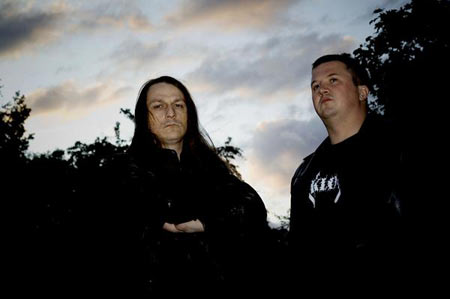 Your debut album was considerably heavier, more dynamic and featured prominent keyboards, something which was relatively unheard of at the time. It did came out at the right moment, Cradle Of Filth had just released "Dusk...and Her Embrace" to critical acclaim and Dimmu Borgir were rising out of the underground with the original "Stormblast".
Your debut album was considerably heavier, more dynamic and featured prominent keyboards, something which was relatively unheard of at the time. It did came out at the right moment, Cradle Of Filth had just released "Dusk...and Her Embrace" to critical acclaim and Dimmu Borgir were rising out of the underground with the original "Stormblast".
Many people still think that if a bigger label had supported our album, it would have been certainly acclaimed by the international metal public. "For a Glory…" uncompromisingly broke stereotypes in the black metal music, opting for new and daring arrangements. It's not that I'm conceited, but "Dusk and Her Embrace" and "Stormblast" were released a year later after our debut.
At what point did Mastiphal become "the most hated" Polish black metal band? Had this to do with the fact that you were far more dynamic and symphonic compared to most traditional black metal at the time?
For sure, it was one of the reasons. We never stopped experimenting with music or looked for new arrangements. Symphonic elements in black metal were something new at that time. Many fans of the traditional black metal vibes still haven't accepted it yet. Some people didn't like our coloured photos, another couldn't even accept that we played gigs as it was seen as something untrue! On the other hand, you have to know that Poland is an extremely Catholic country and we had many problems with the authorities. We had a police raid in our flats, the gutter press published articles blaming us for the suicide of some kids who had been listening to Mastiphal. In short, we had more enemies than friends within and out of the black metal scene. Well, that was the "charm" of the dark 90s. Undoubtedly, most fans focused on "the events" on the Norwegian black metal scene, however, believe me that many interesting things also happened in Poland at the same time (laugs).
Tell us something about the hardships, problems and struggles that extreme metal bands behind the Iron Curtain went through in the early 1990's. I can imagine that it was hard to get decent gear, a rehearsal studio and find affordable recordings studios that knew how to handle and correctly produce extreme metal?
When we founded our first band at the beginning of the 90's, the conditions were so harsh. I remember that our guitarist used a poor Polish guitar and he didn't change strings for two years! He just had no money. Besides, importing good strings was a miracle! After rehearsals, his fingers were literally bleeding. Our drummer replaced the second bass drum by a small leatherette tabouret because it was absolutely impossible to buy a double drum bass set. Obviously, none of us was able to afford two single drum bass sets which would let us assembly the double set of our dreams. We kept wandering from one community centre to another and were chased away from all of them. Finally we ended up playing in garages or cellars. It was highly impossible to release a metal album in a professional way as most of the Polish recording studios had a vague idea on what metal music was. Besides, you had to pay a pretty penny for recording in studio and, what is more, many labels had serious problems with paying bands back for recording. In short, believe me, you had to be extremely determined to play metal in Poland at that time (laughs). Only few bands have survived the trial.
When did Dutch label Nocturn Records approach the band to re-release this debut in 1996 and was their offer better than the original Baron Records deal? This record has no less than three different cover arts, was that the result of the different labels it was released through?
Nocturn Records seemed to give us an opportunity to become known beyond Poland. As Baron Records couldn't distribute our albums abroad, they didn't make a fuss about that. Was their offer better? Man, times were such that you signed a contract with any label just for few copies of your own album. What about the cover-art? Well, Nocturn wanted it to be different from the first edition. And the third cover version was made by Polish bootleggers who pretended to represent Baron Records. Despite certain suspicions, we still don't know who they were.
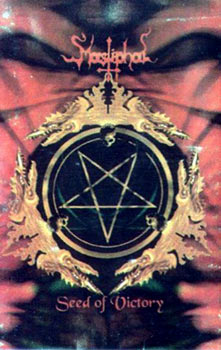 How did the folding of the Nocturn Records label affect Mastiphal and the album you had released through them? I can imagine it must have been years in legal limbo before you were able to reclaim the copyrights.
How did the folding of the Nocturn Records label affect Mastiphal and the album you had released through them? I can imagine it must have been years in legal limbo before you were able to reclaim the copyrights.
Nocturn Records dissolved soon after releasing our debut and the owner focused on his own band. We were offered to re-release the album several times. However, we didn't decide to do that until we release something new.
1996 saw the independent release of the "Promo '96", which included a new track and a cover of Kat's 'Mag-Sex'. What were the reasons that Mastiphal was forced into independence and didn't continue cooperating with Baron Records?
To be fair, the name "Promo 96" appeared after years. Someone just made up the name and it didn't change anymore. At that time we were offered to contribute to two compilations. First one was the tribute to Kat, a legendary heavy metal band from Poland. The second was released as "A Tribute to Hell" by the American Full Moon Records and included Mayhem, Mysticum, Acheron or Naglfar. Anyway, it wasn't the stuff we wanted to look for a new label with. And Baron? In our opinion, cooperating with them made no sense any more.
"Promo '96" was recorded at Cyber Studio in Katowice, Poland. How was that compared to earlier recording sessions?
Our sound was better from one record to another. We learnt pretty fast and got more and more conscious of what we want our band to be. Our first demo, recorded in Fors in Czech Republic had a dirt and harsh sound which was close to the black metal aura at that time. "For a Glory…" was recorded in a pretty decent studio, however people we had to cooperate with didn't know about metal music as much as we could expect. Recording in Cyber Studio seemed to be an optimal solution at that time. We knew the guys from the studio and they helped us to get a Mesa Boogie amplifier and our drummer could finally play with triggers. It was a remarkable change for us and I still like the sound of that tracks. However, it is very hard to compare our albums with reference to their sound. Each of them was different and had something charming.
In 1998 came the "Seed Of Victory" tape compilation through Vox Mortiis Records. It contained the "For A Glory Of All Evil Spirits, Rise for Victory" plus the two tracks from the "Promo '96". How did this deal and compilation with Vox Mortiis come about?
The Polish label Vox Mortiis was thriving at that time, supporting bands such as Behemoth or Hate. They invited us to cooperate with them. Firstly, we had to start by re-releasing our demo and our first album, and then to record a new album. Unfortunately, the label disappeared as fast as it appeared on the Polish metal market. Those guys didn't feel metal enough, so they just packed up. As a result, the new album of Mastiphal had no chance to be recorded.
Under what circumstances did you decide that is was time for Mastiphal to be laid to rest? Were there problems in the line-up or did you never quite achieve what you hoped for during the time of the band's existence?
To be fair, there was a couple of reasons of our rest such as problems of finding a rehearsal room, line-up problems or quite divergent ideas of what the next album should be. If you add problems of finding a new label, you will have the answer. On the other hand, we've never said: "that's the end of Mastiphal". In a certain moment I focused on Darzamat which had just come into existence and gave up arranging new tracks for Mastiphal. Cymeris needed a little bit more time, but he finally got involved in his new project Iperyt. In the meantime we tried to do something absolutely different and founded InDread Cold. As InDread Cold we recorded the album called "Underaba", which was released by the English label Black Doom, founded by My Dying Bride guitarists. However, that music was so twisted that only few people appreciated it and, as a result, the project quickly collapsed (laughs). Of course, "the Mastiphal's case" emerged from time to time. We even met a couple of times, had some beer playing together the old stuff. However, it seems that none of us was determined enough to do something more.
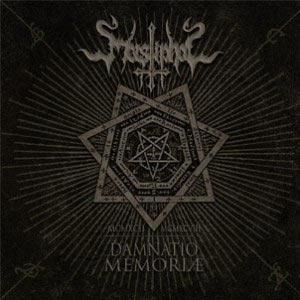 Now some ten years after your last release Witching Hour Productions has compiled all of the band's recorded output in a lush double digipack album called "Damnatio Memoriae". When did they approach you about this re-release and how much say did you have in this re-release?
Now some ten years after your last release Witching Hour Productions has compiled all of the band's recorded output in a lush double digipack album called "Damnatio Memoriae". When did they approach you about this re-release and how much say did you have in this re-release?
We released our last record eleven years ago, to be exact. The whole story is very short. As I said, we were offered to re-release our albums several times, however I didn't agree as we had no plans to record something new and, what is more, I didn't trust people proposing me to do that. Everything changed when Bart from Witching Hour Productions contacted me. As you probably now, he's the vocalist of Hermh, one of the most important bands of the old black metal scene in Poland. This fact made me sure that he was the right person for the job. I was sure that he'd never screw it up. Everyone but him! (laughs) After that, things happened fast. We reached an agreement in the spring and the album was on sale just after the summer vacation.
It was also recently announced that Mastiphal plans to write and record a new album, scheduled for 2010 on Witching Hour Productions. What events triggered the resurrection of Mastiphal in particular?
As I mentioned, we have never said: "that's the end of the band". I'd say the possibility of comeback was dormant and the Bart's offer was a sort of awakening. To be fair, it was he who persuaded me to record something new. Afterwards, I met Cymeris, we had a short talk, played several rehearsals, and we said: "OK, the time has come." Now, we'll see if we'll find enough power and enthusiasm (laughs).
Considering you are busy with your main band Darzamat – what are your ambitions and expectations towards this new Mastiphal album? Will you take this album on the road if the demand is there or will you only limit yourself to being a studio project?
I think only the time will show. I do think about concerts, however, all we have to focus on now is to work hard on new stuff. We don't want to come back with a crap. It's been the main problem so far. We preferred not to record anything new than release a mediocre album. To be fair, I have a strange feeling that if we come back, it will be something more serious than a studio project. Indeed, I've been busy with Darzamat since we released the new album "Solfernus Path" and started cooperating with the German tour agency Go Down Believing. However, I'm pretty sure I will find enough time and energy both for Darzamat and Mastiphal.
Rafal, thanks for your time to do this interview with us. Good luck with Darzamat and Mastiphal. If there's anything I forgot to mention – here's the space!
I'd like to say a big thank you for your support. It's a pleasure to talk with guys like you who still remember our music after years. I hope that those of you who are waiting for the new album won't be disappointed by it. Anyway, no need to waste my breathe. We'll come back to that in a couple of months. Let the music speak first for itself!
Info: www.witchinghour.pl
 The black metal of the early 1990's is mostly associated with North-European countries such as Norway, Sweden and Finland. Around the same time in East-Europe the scene was exploding as well. In Poland, specifically, three bands formed that would form cornerstone functions in this pioneering genre: Christ Agony, Xantotol and Mastiphal. Witching Hour Productions released a lush double-digipack of Mastiphal's recorded history with "Damnatio Memoriae". Masterful Magazine recently was able to arrange a chat with Mastiphal mainman Rafal "Flauros" Góral. This resulted in a spirited conversation about the early black metal scene and mentality, the struggles and tribulations of bands behind the Iron Curtain and why it took so long to get Mastiphal's recorded history re-issued and available again.
The black metal of the early 1990's is mostly associated with North-European countries such as Norway, Sweden and Finland. Around the same time in East-Europe the scene was exploding as well. In Poland, specifically, three bands formed that would form cornerstone functions in this pioneering genre: Christ Agony, Xantotol and Mastiphal. Witching Hour Productions released a lush double-digipack of Mastiphal's recorded history with "Damnatio Memoriae". Masterful Magazine recently was able to arrange a chat with Mastiphal mainman Rafal "Flauros" Góral. This resulted in a spirited conversation about the early black metal scene and mentality, the struggles and tribulations of bands behind the Iron Curtain and why it took so long to get Mastiphal's recorded history re-issued and available again. Hi Rafal! Thanks for doing this interview with us. How does it feel to have Mastiphal's recorded output finally compiled and available again?
Hi Rafal! Thanks for doing this interview with us. How does it feel to have Mastiphal's recorded output finally compiled and available again? 1993 saw the formation of another Mastiphal in Gdansk, a band which at one point would feature session drums by Adam "Nergal" Darski, who would go on to front now established death/black metal mammoth Behemoth. Did this give any problems that you remember, with two black metal acts operating under the same name?
1993 saw the formation of another Mastiphal in Gdansk, a band which at one point would feature session drums by Adam "Nergal" Darski, who would go on to front now established death/black metal mammoth Behemoth. Did this give any problems that you remember, with two black metal acts operating under the same name? "For A Glory Of All Evil Spirits, Rise for Victory" – Mastiphal's proper debut record – was recorded at Music Project Studio in Katowice, Poland. The production on this is notably better in quality compared to "Sowing Profane Seed". In what ways were these sessions different than the ones from the demo? Came the band better prepared and well-rehearsed into the studio to cut this album?
"For A Glory Of All Evil Spirits, Rise for Victory" – Mastiphal's proper debut record – was recorded at Music Project Studio in Katowice, Poland. The production on this is notably better in quality compared to "Sowing Profane Seed". In what ways were these sessions different than the ones from the demo? Came the band better prepared and well-rehearsed into the studio to cut this album? Your debut album was considerably heavier, more dynamic and featured prominent keyboards, something which was relatively unheard of at the time. It did came out at the right moment, Cradle Of Filth had just released "Dusk...and Her Embrace" to critical acclaim and Dimmu Borgir were rising out of the underground with the original "Stormblast".
Your debut album was considerably heavier, more dynamic and featured prominent keyboards, something which was relatively unheard of at the time. It did came out at the right moment, Cradle Of Filth had just released "Dusk...and Her Embrace" to critical acclaim and Dimmu Borgir were rising out of the underground with the original "Stormblast". How did the folding of the Nocturn Records label affect Mastiphal and the album you had released through them? I can imagine it must have been years in legal limbo before you were able to reclaim the copyrights.
How did the folding of the Nocturn Records label affect Mastiphal and the album you had released through them? I can imagine it must have been years in legal limbo before you were able to reclaim the copyrights. Now some ten years after your last release Witching Hour Productions has compiled all of the band's recorded output in a lush double digipack album called "Damnatio Memoriae". When did they approach you about this re-release and how much say did you have in this re-release?
Now some ten years after your last release Witching Hour Productions has compiled all of the band's recorded output in a lush double digipack album called "Damnatio Memoriae". When did they approach you about this re-release and how much say did you have in this re-release?